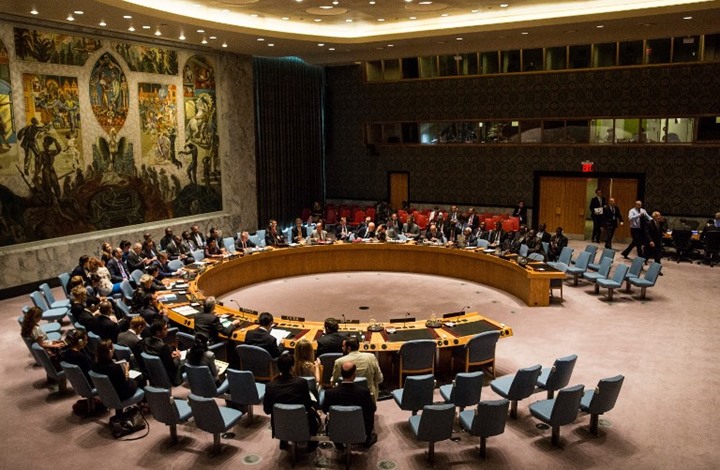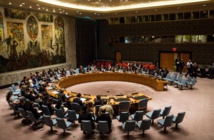A convoy entered the town of Daraya for the first time since 2012 on Wednesday and a second delivery reached Moadamiyeh for the first time since March.
Russia's Ambassador Vitaly Churkin welcomed the aid deliveries as a positive step and suggested that plans to airdrop humanitarian relief could be put on hold for now.
French Ambassador Francois Delattre, who holds the council presidency this month, said access to the towns and villages under siege remained blocked and blamed the Syrian regime.
"France is asking the United Nations and in particular the WFP to begin humanitarian airdrops for all the areas in need, beginning with Daraya, Moadamiyeh and Madaya, where the civilian population including children risks dying of hunger," Delattre told a press conference.
- 'Too little, too late' -
Britain called for the emergency Security Council meeting on Friday to discuss humanitarian access and to press ahead with the airdrops decided at a meeting last month of the 20-nation International Syria Support Group (ISSG).
"It's too little, too late," said British Ambassador Matthew Rycroft. "I think that we need to press on with what the ISSG said, which is, in that scenario, there needs to be airdrops."
The ISSG set June 1 as the deadline for aid convoys to reach all besieged areas.
The group asked the World Food Programme (WFP) to begin preparations for airdrops if aid remained blocked although it remains unclear whether the Syrian government will give its approval for the planes carrying relief supplies.
"Airdrops are much more complicated and much less effective and so I think we need to continue to pursue with land deliveries," Churkin said.
In Washington, US State Department spokesman John Kirby said deliveries to the two towns were "far from sufficient" and that the United States supported moving forward on plans for the airdrops.
UN envoy for Syria Staffan de Mistura and Stephen O'Brien, the under-secretary general for humanitarian affairs, will brief council members on Friday.
According to the United Nations, a total of 592,000 people live under siege in Syria -- the majority besieged by regime forces -- and another four million live in hard-to-reach areas.
Peace talks to end Syria's five-year war stalled in April after the opposition walked out over escalating fighting on the ground and lack of humanitarian aid.
----------------------------------------------------------------------------------------------------------------------------------
Russia's Ambassador Vitaly Churkin welcomed the aid deliveries as a positive step and suggested that plans to airdrop humanitarian relief could be put on hold for now.
French Ambassador Francois Delattre, who holds the council presidency this month, said access to the towns and villages under siege remained blocked and blamed the Syrian regime.
"France is asking the United Nations and in particular the WFP to begin humanitarian airdrops for all the areas in need, beginning with Daraya, Moadamiyeh and Madaya, where the civilian population including children risks dying of hunger," Delattre told a press conference.
- 'Too little, too late' -
Britain called for the emergency Security Council meeting on Friday to discuss humanitarian access and to press ahead with the airdrops decided at a meeting last month of the 20-nation International Syria Support Group (ISSG).
"It's too little, too late," said British Ambassador Matthew Rycroft. "I think that we need to press on with what the ISSG said, which is, in that scenario, there needs to be airdrops."
The ISSG set June 1 as the deadline for aid convoys to reach all besieged areas.
The group asked the World Food Programme (WFP) to begin preparations for airdrops if aid remained blocked although it remains unclear whether the Syrian government will give its approval for the planes carrying relief supplies.
"Airdrops are much more complicated and much less effective and so I think we need to continue to pursue with land deliveries," Churkin said.
In Washington, US State Department spokesman John Kirby said deliveries to the two towns were "far from sufficient" and that the United States supported moving forward on plans for the airdrops.
UN envoy for Syria Staffan de Mistura and Stephen O'Brien, the under-secretary general for humanitarian affairs, will brief council members on Friday.
According to the United Nations, a total of 592,000 people live under siege in Syria -- the majority besieged by regime forces -- and another four million live in hard-to-reach areas.
Peace talks to end Syria's five-year war stalled in April after the opposition walked out over escalating fighting on the ground and lack of humanitarian aid.
----------------------------------------------------------------------------------------------------------------------------------









 Home
Home Politics
Politics











